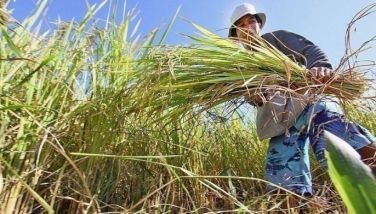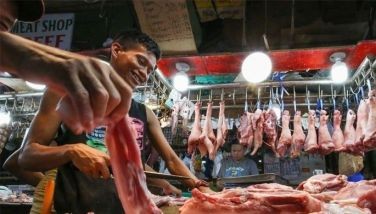Learning ICT on board a bus
September 25, 2005 | 12:00am
It was agriculture technician Rodrigo Hermosura’s first time to enter an Internet café.
"I was a bit afraid because I didn’t know how to use a computer," he said. Two days later, Hermosura was surfing the web, sending emails, and chatting with friends and co-workers. He has also learned how to do basic office productivity tasks using the computer.
Hermosura and 57 other agricultural technicians from local government units in the Davao provinces recently took a two-day basic ICT (information and communications technology) training to become familiar with using computers and the Internet in the course of their work.
The training, a joint effort of the University of Southern Mindanao, Davao del Sur’s Office of the Provincial Agriculturist, Department of Agriculture, and the Department of Science and Technology (DOST XI), is part of the Open Academy for Philippine Agriculture (OPAPA), an ongoing program to equip extension workers with modern tools – such as computers and the Internet – so they can take advantage of the explosion of information on the Web.
"We are already 10 years late in information," PhilRice (Philippine Rice Research Institute) executive director and OPAPA advisory council chairman Dr. Leocadio S. Sebastian said, adding that with ICT, "we can now go to any Internet café and download the latest information on rice, and other crops."
From August to December, the OPAPA aims to train 1,000 extension workers in five pilot sites in the country – Isabela, Nueva Ecija, Pampanga, and Davao.
Trained in two local Internet cafés and aboard a specially equipped bus, the participants were guided in navigating through two important agricultural websites, the Pinoy Farmers’ Internet (www.openacademy.ph) and Rice Knowledge Bank (www.knowledgebank.irri.org). They also visited other useful websites of partner agencies of the Open Academy.
"We simulated a real-world situation for the training," Barroga said.
To overcome the extension workers’ initial fear of the technology, the training is held in a familiar setting, an Internet café.
"Internet cafés abound, and are easily accessible," he said. He added that teaching step-by-step procedures – from handling and manipulating the mouse, to creating and saving documents – jump-started the participants’ learning on the use of computers.
"We minimized the lectures and concentrated more on actual hands-on sessions," he added.
Training staff from USM, DOST XI and PhilRice guided the extension workers in the hands-on sessions.
"For areas with no available computer facilities, we are also deploying a mobile IT bus," Barroga said.
Owned by the DOST Science Education Institute, the bus is equipped with 17 notebook PCs and a built-in audio-visual system, complete with a VHS player, and an LCD projector. Six such buses are deployed nationwide in Davao, Butuan, Los Baños, Laguna, and La Union. Custom-built by Daewoo Philippines, the bus can seat 32 persons and was initially designed for use by elementary and high school students.
The bus, though equipped with notebook PCs, is not "Internet-ready" – it has no network and Internet connection. To connect to the Internet, the bus was parked near an Internet café, where a wireless access point (WAP) was set up. The notebooks were supplied by PhilRice and USM IT personnel with WiFi PC cards to connect to the WAP, which was linked to the café’s 256-kbps DSL connection.
"This is the first time the bus was used to train agriculture extension workers. This is also the first time it was employed for teaching the use of the Internet," Barroga said.
DOST Region XI director Morados said the use of the bus is timely, "since there is a directive from the top to expand its use in order to sustain the bus. We are now thinking of a Mindanao-wide deployment of the bus, through a tie-up with the OPAPA."
For Hermosura and the other agricultural technicians, it was not just a capability-enhancement training. For 60-year-old Donatila Blanco, from the Davao provincial agriculture office, it was like opening a new door: like Hermosura, she was also afraid of the computer and didn’t have any experience with it. After the training, she learned how to send email and surf the web. It was also the first time for almost all participants to visit the website of their agency, the Department of Agriculture (www.da.gov.ph).
"We’re providing them with new tools they can use to help farmers improve their productivity," Barroga said, adding that with the deployment of an Internet-ready mobile IT bus, "the OPAPA is moving one step closer to bringing ICT to the farmers and extension workers."
Through the OPAPA’s portal, the Pinoy Farmers’ Internet, extension workers and farmers can get up-to-date information on farming technologies, and best practices. Mobile SMS-based applications, like a text-based querying system, are also available for information even without surfing the Web.
The OPAPA is part of a bigger ICT project, called the K-AGRINET, where it represents the e-learning component of the project, with PCARRD’s e-Consortia and e-Farm connecting more than 80 LGU based FITS centers; and DLR-DAP’s e-Agrikultura deploying ICT directly in farming communities. The project received a combined amount of P168 million for the next three years, from the E-Government Fund, administered by the CICT and the NCC.
"I was a bit afraid because I didn’t know how to use a computer," he said. Two days later, Hermosura was surfing the web, sending emails, and chatting with friends and co-workers. He has also learned how to do basic office productivity tasks using the computer.
Hermosura and 57 other agricultural technicians from local government units in the Davao provinces recently took a two-day basic ICT (information and communications technology) training to become familiar with using computers and the Internet in the course of their work.
"We are already 10 years late in information," PhilRice (Philippine Rice Research Institute) executive director and OPAPA advisory council chairman Dr. Leocadio S. Sebastian said, adding that with ICT, "we can now go to any Internet café and download the latest information on rice, and other crops."
From August to December, the OPAPA aims to train 1,000 extension workers in five pilot sites in the country – Isabela, Nueva Ecija, Pampanga, and Davao.
"We simulated a real-world situation for the training," Barroga said.
To overcome the extension workers’ initial fear of the technology, the training is held in a familiar setting, an Internet café.
"Internet cafés abound, and are easily accessible," he said. He added that teaching step-by-step procedures – from handling and manipulating the mouse, to creating and saving documents – jump-started the participants’ learning on the use of computers.
"We minimized the lectures and concentrated more on actual hands-on sessions," he added.
Training staff from USM, DOST XI and PhilRice guided the extension workers in the hands-on sessions.
Owned by the DOST Science Education Institute, the bus is equipped with 17 notebook PCs and a built-in audio-visual system, complete with a VHS player, and an LCD projector. Six such buses are deployed nationwide in Davao, Butuan, Los Baños, Laguna, and La Union. Custom-built by Daewoo Philippines, the bus can seat 32 persons and was initially designed for use by elementary and high school students.
The bus, though equipped with notebook PCs, is not "Internet-ready" – it has no network and Internet connection. To connect to the Internet, the bus was parked near an Internet café, where a wireless access point (WAP) was set up. The notebooks were supplied by PhilRice and USM IT personnel with WiFi PC cards to connect to the WAP, which was linked to the café’s 256-kbps DSL connection.
"This is the first time the bus was used to train agriculture extension workers. This is also the first time it was employed for teaching the use of the Internet," Barroga said.
DOST Region XI director Morados said the use of the bus is timely, "since there is a directive from the top to expand its use in order to sustain the bus. We are now thinking of a Mindanao-wide deployment of the bus, through a tie-up with the OPAPA."
"We’re providing them with new tools they can use to help farmers improve their productivity," Barroga said, adding that with the deployment of an Internet-ready mobile IT bus, "the OPAPA is moving one step closer to bringing ICT to the farmers and extension workers."
Through the OPAPA’s portal, the Pinoy Farmers’ Internet, extension workers and farmers can get up-to-date information on farming technologies, and best practices. Mobile SMS-based applications, like a text-based querying system, are also available for information even without surfing the Web.
The OPAPA is part of a bigger ICT project, called the K-AGRINET, where it represents the e-learning component of the project, with PCARRD’s e-Consortia and e-Farm connecting more than 80 LGU based FITS centers; and DLR-DAP’s e-Agrikultura deploying ICT directly in farming communities. The project received a combined amount of P168 million for the next three years, from the E-Government Fund, administered by the CICT and the NCC.
BrandSpace Articles
<
>
- Latest
Latest
Latest
March 27, 2025 - 2:48pm
March 27, 2025 - 2:48pm
March 26, 2025 - 3:46pm
By Dominique Nicole Flores | March 26, 2025 - 3:46pm
February 28, 2025 - 11:26am
By Dominique Nicole Flores | February 28, 2025 - 11:26am
February 24, 2025 - 6:28pm
By Dominique Nicole Flores | February 24, 2025 - 6:28pm
February 19, 2025 - 7:28pm
By Dominique Nicole Flores | February 19, 2025 - 7:28pm
Recommended





























